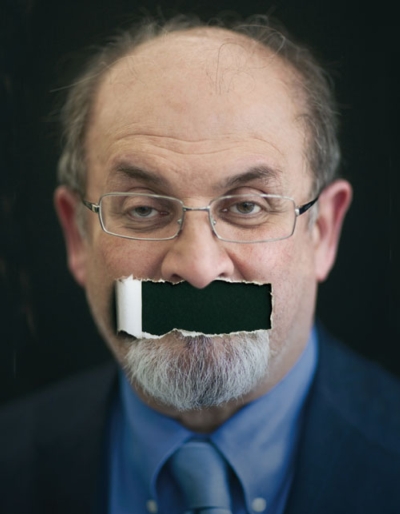 “A poet’s work. To name the unnameable, to point at frauds, to take sides, start arguments, shape the world and stop it from going to sleep.” So says the irreverent, satirical poet Baal in The Satanic Verses. What Salman Rushdie’s non-appearance at India’s Jaipur Literature Festival in January reveals is that too few people these days think like Baal.
“A poet’s work. To name the unnameable, to point at frauds, to take sides, start arguments, shape the world and stop it from going to sleep.” So says the irreverent, satirical poet Baal in The Satanic Verses. What Salman Rushdie’s non-appearance at India’s Jaipur Literature Festival in January reveals is that too few people these days think like Baal.
Rushdie was due to have attended the Festival to give a talk about his novel Midnight’s Children, the film of which is released later this year. Rushdie has visited India many times over the past decade and has attended the Festival before. This time Muslim activists issued threats. Instead of standing up to the bullies, both local and state governments caved in, both exerting pressure on the Festival organisers to keep Rushdie away.
In the end Rushdie cancelled his trip, having, he said, received information about a plot to assassinate him, a plot that now appears may have been invented by the Rajasthan police to “persuade” Rushdie not to come. In response, four writers, Hari Kunzru, Amitava Kumar, Jeet Thayil and Rushir Joshi, all speakers at the Festival, publicly read passages from The Satanic Verses. The novel has been banned in India since 1988 under Islamist pressure. The Festival organisers were outraged at what they called an “unnecessary provocation”, threatening “all necessary, consequential action” against any others who followed suit.
While many have shown support for Rushdie, others have also sprung to the defence of the Festival organisers. “I’m not sure this Rushdie intervention was wise or effective,” tweeted Guardian books editor Claire Armitstead about the decision to read from The Satanic Verses. But if it is not the role of literary festivals to stand up for writers, and to defend their right to speak, especially in these circumstances, it is difficult to know what is. The Festival’s decision not just to distance itself from Kunzru and Kumar but to threaten others who might be thinking of following suit was nothing less than cowardly.
Contrast the pusillanimity of the Jaipur Festival organisers with the response of writers, publishers, editors, translators and booksellers faced with Ayatollah Khomeini’s fatwa in 1989. Salman Rushdie was forced into hiding for almost a decade. Translators and publishers were assaulted and even murdered. Hitoshi Igarashi, a Japanese professor of literature and translator of The Satanic Verses, was knifed to death. The Italian Ettore Capriolo, another translator of Rushdie’s novel, was beaten up and stabbed. William Nygaard, the Norwegian publisher of The Satanic Verses, was shot three times and left for dead outside his home in Oslo. Bookshops were firebombed for stocking the novel.
Penguin’s CEO at the time was Peter Mayer, and he talked publicly about those events for the first time in an interview he gave for my book From Fatwa to Jihad. Mayer himself was subject to a vicious campaign of hatred and intimidation. “I had letters delivered to me written in blood,” he remembered. “I had telephone calls in the middle of the night, saying not just that they would kill me but that they take my daughter and smash her head against a concrete wall. Vile stuff.” Yet neither Mayer nor Penguin countenanced backing down. “I told the [Penguin] board, ‘Any climbdown now will only encourage future terrorist attacks by individuals or groups offended for whatever reason by other books that we or any publisher might publish. If we capitulate, there will be no publishing as we know it.’” Mayer and his colleagues recognised that “what we did now affected much more than simply the fate of this one book. How we responded to the controversy over The Satanic Verses would affect the future of free inquiry, without which there would be no publishing as we knew it, but also, by extension, no civil society as we knew it. All we could do was to uphold the principles that underlay our profession and which have brought it respect. We were publishers. I thought that meant something. We all did.”
Mayer belonged to a world in which the defence of free speech was seen as an irrevocable duty. The organisers of Jaipur Festival belong to a different world, one in which the idea that a poet’s work is “To name the unnameable, to point at frauds, to take sides, start arguments, shape the world and stop it from going to sleep” is seen not as self-evident but as shockingly offensive. Over the past two decades, the very landscape of free speech and censorship has been transformed, as has the meaning of literature.
Once, free speech was seen as an inherent good, the fullest extension of which was a necessary condition for the elucidation of truth, the expression of moral autonomy, the maintenance of social progress and the development of other liberties. Today it is as likely to be seen as a threat to liberty as its shield. It is not intrinsically a good but inherently a problem because speech inevitably offends and harms. Speech, therefore, has to be restrained, not in exceptional circumstances, but by custom, especially in a diverse society with a variety of deeply held views and beliefs. Censorship (and self-censorship) has to become the norm. The response of the Jaipur organisers gave expression to this transformation.
The trouble is that the more that policymakers give licence for people to be offended, the more that people will seize the opportunity to feel offended. A week after Islamists kept Rushdie out of Jaipur, Hindu activists forced Pune’s Symbiosis University to cancel a screening of Jashn-e-Azadi, a new film about Kashmir, because it was “anti-India”. “If you set up a marketplace of outrage,” as the novelist Monica Ali once observed, “you have to expect everyone to enter it. Everyone now wants to say, ‘My feelings are more hurt than yours.’” And that’s the world in which we now live. It is a world of which Baal would despair.
A longer version of this article is on Kenan Malik’s blog. Read Nick Cohen’s ten-point plan to save free speech, published in the March/April 2012 issue of New Humanist

